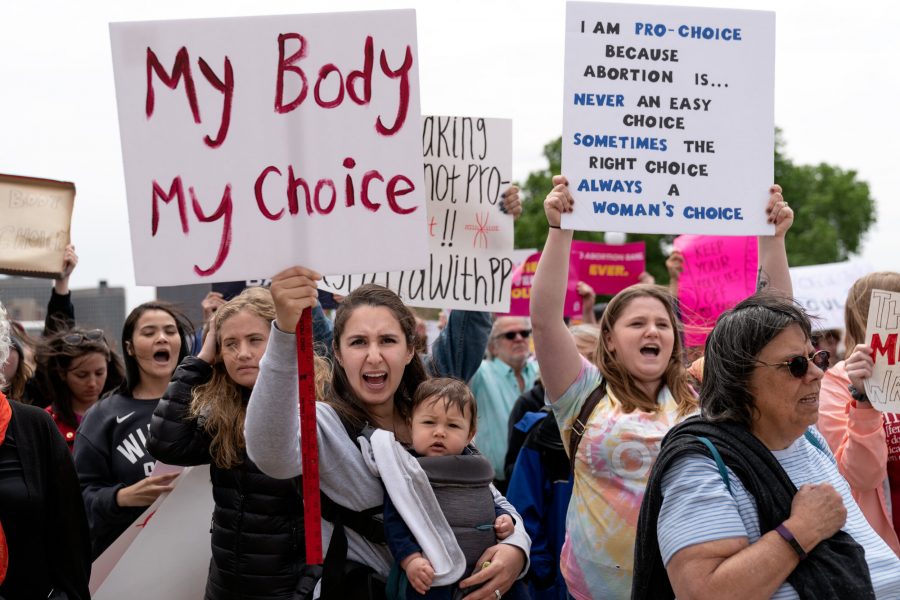States shouldn’t delay and label abortions as nonessential during COVID-19 pandemic
April 3, 2020
Ohio was the first state to include abortions under nonessential medical procedures set to be postponed. The Ohio Attorney General Dave Yost’s office sent “warning letters to abortion clinics in Dayton, Cincinnati and Cleveland, telling them to ‘immediately stop performing nonessential and elective surgical abortions,’” according to The New York Times.
In an executive order issued on March 22, Texas Gov. Gregg Abbott set an immediate postponing of all nonessential medical procedures until April 21 and placed a penalty of $1,000 or 180 days of jail time if a person fails to comply. Texas Attorney General Ken Paxton clarified Abbott’s meaning behind nonessential medical procedures.
The executive order included routine procedures and “most scheduled healthcare procedures that are not immediately medically necessary such as orthopedic surgeries or any type of abortion that is not medically necessary to preserve the life or health of the mother,” said Paxton in a statement.
Mississippi Gov. Tate Reeves has called to follow Texas and Ohio in postponing abortions, which for the state would mean halting the only clinic that offers abortions to patients.
Reeves during a press conference said he’d impose “whatever action we need to to protect the not only the lives of unborn children, but also the lives of anyone who may contract this particular virus,” CBS News reported.
As COVID-19 positive cases overwhelmingly rise across the U.S. so does the need for hospital beds and protective gear for health care professionals. This is the kind of sentiment that state officials in these traditionally anti-abortion right states are relying on to postpone all nonessential medical procedures.
While it is important to have enough equipment and space in hospitals to take care of COVID-19 patients, it isn’t fair to compare a toe surgery to an abortion.
An abortion is time, money and health sensitive in which women face various factors in deciding upon getting the medical procedure and importantly, abortion isn’t as easily accessed as the other medical procedures labeled as nonessential.
“Abortion is an essential and time-sensitive medical procedure — and it must remain so during this public health crisis. Delays or additional barriers to care can make it more difficult or even impossible for patients to access safe, legal abortion. #COVID19,” tweeted Planned Parenthood, a non-profit organization that provides reproductive healthcare.
Roe v. Wade, a 1973 U.S. Supreme Court case, established that a women’s right to choose an abortion is protected by the U.S. Constitution. However, anti-abortion groups and states have limited the chances for women to decide on getting an abortion.
“Nearly half of the 58 new abortion restrictions enacted in 2019 would ban all, most or some abortions,” reported the Guttmacher Institute, an abortion-rights research organization. “This surge in abortion bans is a distinct departure from the strategy deployed by abortion opponents for decades, which was to adopt less sweeping abortion restrictions with a cumulative impact of denying care to patients and forcing clinics to close.”
These states that have postponed abortions have in the past placed restrictions to somehow delegate a woman’s reproductive rights, which eliminates any coincidence on their true reasoning behind categorizing abortions as nonessential medical procedures.
“Abortion is an essential component of comprehensive health care. It is also a time-sensitive service for which a delay of several weeks, or in some cases days, may increase the risks or potentially make it completely inaccessible. The consequences of being unable to obtain an abortion profoundly impact a person’s life, health and well-being,” said The American College of Obstetricians and Gynecologists in a joint statement with other medical groups.
In this case, by labeling abortion as a nonessential medical procedure it harms women and it sets a norm that abortions are not important in times of a crisis. This kind of mentality can lead to a setback on abortion rights across the nation.
If it is socially acceptable for abortions to be delayed during a health crisis then this kind of approach can also transcend to once the health crisis has calmed down or ended. It will become easier for anti-abortion groups to point at this and say that abortions offered space in hospitals during a pandemic and can during normal times. This kind of idea on the worth of abortions belittles the choice women should have on their own bodies.







